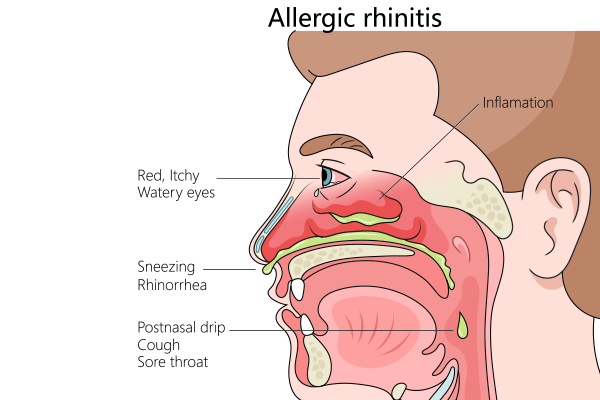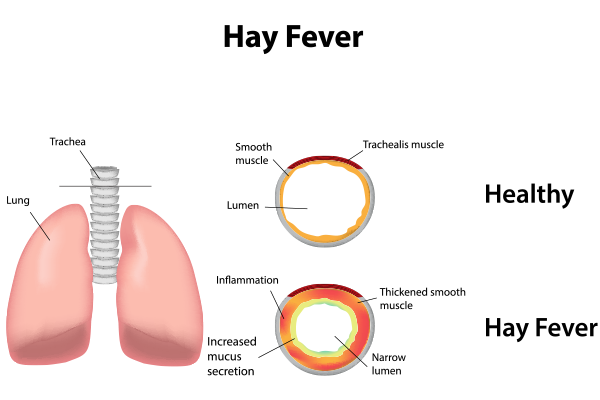
Imagine stepping outside on a beautiful spring morning, ready to enjoy the sunshine, only to be met with relentless sneezing, itchy eyes, and a runny nose. If this scenario sounds familiar, you may be suffering from hay fever—a common yet frustrating condition that affects millions of people worldwide. But what exactly is hay fever? Why does it flare up during certain times of the year, and what can you do to manage it effectively? This guide will take you through everything you need to know about rhinitis, including its causes, symptoms, and the best approaches for rhinitis treatment and rhinitis therapy.
Synopsis
What is Hay Fever (Allergic Rhinitis)?
Hay fever, also known as allergic rhinitis, is an allergic reaction to airborne substances such as pollen, dust mites, pet dander, and mould spores. It is classified into two types:
-
Seasonal Allergic Rhinitis: Triggered by pollen from trees, grasses, and weeds, occurring during specific seasons.
-
Perennial Allergic Rhinitis: Caused by allergens present year-round, such as dust mites, pet fur, and mould.

Hay Fever Symptoms
The symptoms of hay fever can vary in severity but commonly include:
What Causes Hay Fever?
Hay fever occurs when the immune system overreacts to harmless airborne allergens. Common triggers include:
-
Pollen from trees, grass, and weeds (seasonal allergies)
-
Pet dander (hair and skin flakes from cats and dogs)
-
Mould spores (fungal particles in damp areas)
-
Dust mites (tiny organisms found in bedding, carpets, and upholstery)
-
Air pollution (smoke, strong odours, chemicals)
How is Hay Fever Diagnosed?
Doctors diagnose allergic rhinitis based on:
-
Medical history: Discussing symptoms, frequency, and triggers
-
Allergy tests: Skin prick tests or blood tests to identify specific allergens
-
Physical examination: Checking the nasal passages and throat for inflammation

Rhinitis Treatment and Therapy Options
Managing hay fever symptoms involves avoiding triggers, medication, and long-term therapy. Here are some effective options:
1. Avoidance Strategies
-
Monitor pollen counts and stay indoors during peak seasons.
-
Use air purifiers to reduce indoor allergens.
-
Keep windows closed to prevent pollen from entering your home.
-
Wash hands and face after outdoor activities to remove allergens.
-
Change clothes after being outside to avoid pollen transfer.
2. Over-the-Counter (OTC) Medications
-
Antihistamines: Reduce sneezing, runny nose, and itching (e.g., cetirizine, loratadine).
-
Nasal sprays: Corticosteroids help reduce inflammation (e.g., fluticasone, mometasone).
-
Decongestants: Relieve nasal congestion (e.g., pseudoephedrine, oxymetazoline).
-
Eye drops: Alleviate redness and itching in the eyes.
3. Prescription Medications
-
Leukotriene receptor antagonists: Help with nasal and asthma symptoms.
-
Immunotherapy (Allergy Shots): Gradual exposure to allergens to build resistance.
4. Natural Remedies
-
Saline nasal rinses: Flush out allergens and mucus.
-
Steam inhalation: Helps clear nasal passages.
-
Local honey: Thought to build tolerance to pollen (though evidence is limited).
Comparing Hay Fever Treatments
|
Treatment Type |
Effectiveness |
Side Effects |
Recommended For |
|
Antihistamines |
High |
Drowsiness (some) |
Mild to moderate symptoms |
|
Nasal Steroids |
Very High |
Nosebleeds, dryness |
Persistent symptoms |
|
Decongestants |
Medium |
Increased blood pressure |
Short-term relief |
|
Immunotherapy |
Long-term relief |
Injection reactions |
Severe allergies |
|
Natural Remedies |
Varies |
Minimal |
Mild symptoms |
Lifestyle Changes to Reduce Symptoms
-
Eat a balanced diet rich in anti-inflammatory foods.
-
Exercise regularly to strengthen your immune system.
-
Stay hydrated to thin mucus and ease congestion.
-
Reduce stress as it can worsen allergy symptoms.
When to See a Doctor
If your hay fever symptoms persist despite medication or significantly impact your daily life, seek medical advice. Persistent allergies may lead to complications such as:
-
Sinus infections
-
Sleep disturbances
-
Reduced concentration and productivity
Conclusion: Get Expert Care at Manipal Hospitals Baner
While hay fever can be a nuisance, effective rhinitis treatment and rhinitis therapy can make a world of difference. If you’re struggling with persistent allergies, consult the ENT specialists at Manipal Hospitals Baner for expert diagnosis and personalised treatment plans. Don’t let allergies hold you back—get the right care today!
FAQ's
No, hay fever does not cause a fever. Despite its name, it only triggers allergic symptoms like sneezing and congestion.
No, allergic rhinitis is not contagious. It is caused by an immune system reaction to allergens, not a virus or bacteria.
Yes, prolonged exposure to allergens can trigger or worsen asthma in some individuals.
Foods rich in vitamin C, omega-3 fatty acids, and antioxidants, like citrus fruits, nuts, and green tea, may help reduce inflammation.
Seasonal hay fever lasts as long as pollen levels are high, while perennial allergic rhinitis can persist year-round depending on exposure to indoor allergens.






















 4 Min Read
4 Min Read

















